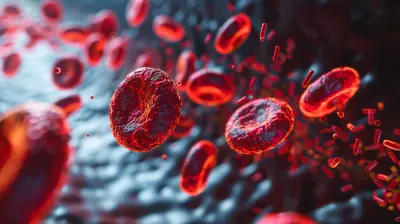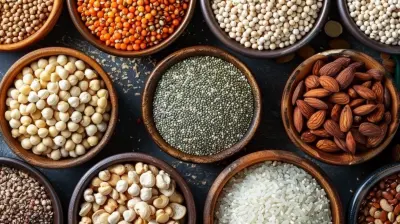5 March 2025
Intermittent fasting (IF) has taken the health and wellness world by storm—it's practically the Beyoncé of modern diet trends. You've probably come across countless Instagram posts, YouTube videos, and new-age fitness gurus hailing it as the holy grail of weight loss and health optimization. But let’s be real: with popularity comes misinformation. For every success story, there seem to be a dozen myths floating around, and that can be confusing.
So, let’s roll up our sleeves and dive into the biggest myths about intermittent fasting and, more importantly, debunk them one by one. Ready? Let’s do this. 
What is Intermittent Fasting, Anyway?
Before we jump into myth-busting, let’s lay down the basics. Intermittent fasting isn’t a diet—it’s a pattern of eating. It’s about when you eat, not necessarily what you eat. Typically, people alternate between periods of eating and fasting. Popular methods include the 16/8 method (16 hours of fasting, 8 hours of eating), the 5:2 method (eating normally 5 days a week and calorie-restricting on 2), or even alternate-day fasting.People love IF for its potential benefits, including weight loss, better metabolic health, and even longer lifespan. Sounds sparkly and perfect, right? Well, not quite, because there are tons of myths that need to be cleared up. 
Myth #1: "Intermittent Fasting is Just Starving Yourself"
Let’s get this straight: intermittent fasting and starving are NOT the same thing. Saying that IF is starving is like comparing skipping dessert at dinner to a full-blown famine. They’re completely different beasts.Fasting is a controlled, voluntary process. Starvation happens when you don’t have a choice. When you fast, your body adjusts by tapping into stored energy—think of it like dipping into your savings account when you’re between paychecks. On the other hand, starvation depletes your energy reserves entirely, leading to malnourishment.
The beauty of IF is that it’s flexible. If you’re hungry during your fasting window, you still have the option to adjust your schedule, break your fast early, or switch to a different fasting method. It’s not about punishment; it’s about balance. 
Myth #2: "You’ll Lose Muscle Instead of Fat"
This myth is a classic scare tactic. People hear "fasting" and immediately picture their hard-earned muscle mass melting away like ice cream on a summer day. But science tells a different story.When done correctly, intermittent fasting doesn’t lead to muscle loss. In fact, during fasting, your body prioritizes fat stores for energy before it even thinks about tapping into your muscle tissue. Plus, fasting triggers the release of human growth hormone (HGH), which helps preserve muscle and even promotes muscle-building.
Here’s the key: pair IF with resistance training and a protein-rich diet, and you’ll be flexing those gains, not losing them. 
Myth #3: "It’s All About Losing Weight"
Sure, weight loss is one of the most popular reasons people try intermittent fasting, but it’s far from the only benefit. Think of weight loss as the tip of the iceberg—there’s so much more beneath the surface.Studies have shown that intermittent fasting can improve insulin sensitivity, reduce inflammation, and support heart health by lowering cholesterol and triglyceride levels. It’s even been linked to brain health, with researchers suggesting it may protect against neurodegenerative diseases like Alzheimer’s.
In other words, intermittent fasting isn’t just a weight-loss "hack"; it’s a tool for overall health optimization.
Myth #4: "You Can Eat Whatever You Want During Eating Windows"
This one’s a major facepalm moment. Just because you’re fasting doesn’t mean you get a free pass to go on a junk food rampage during your eating window. Sorry, but intermittent fasting doesn’t magically turn pizza and donuts into kale and quinoa.The quality of the food you eat still matters. If you load up on ultra-processed foods, your body will respond accordingly. You won’t feel as energetic or see the benefits you’re hoping for. Aim to focus on nutrient-dense, whole foods like lean proteins, healthy fats, and plenty of veggies.
Think of intermittent fasting as a car. The fasting period is the engine, and the food you eat is the fuel. If you fill your car with bad fuel, it won’t run as efficiently, no matter how good the engine is.
Myth #5: "Intermittent Fasting is Dangerous for Everyone"
Let’s address the elephant in the room: not every health trend is suitable for everyone. That’s true for IF, but that doesn’t make it inherently dangerous. For most healthy adults, intermittent fasting is perfectly safe.That said, certain groups—like pregnant or breastfeeding women, people with a history of eating disorders, or individuals with specific medical conditions—should approach fasting cautiously and consult with a healthcare provider. It’s about knowing your body and listening to its signals.
If your body is an orchestra, fasting is like playing a new instrument. It takes a minute to get the timing right, and for some people, it’s not the right tune.
Myth #6: "You’ll Be Hungry All the Time"
Okay, let’s get real—yes, in the beginning, fasting can feel tough. But your body is way smarter than you give it credit for.When you first start fasting, your hunger cues might be all over the place. That’s because your body is accustomed to eating at specific times. But over time, those hunger hormones like ghrelin adjust, and fasting becomes way more manageable.
Think of it like switching from coffee to tea. At first, you might miss the jolt of caffeine, but eventually, your taste buds and body adapt, and you find yourself reaching for tea without even thinking about it.
Pro tip: Stay hydrated during your fasting windows. Sometimes, hunger is just thirst in disguise.
Myth #7: "Fasting Slows Down Your Metabolism"
Reality check: intermittent fasting doesn’t put your metabolism into slow-motion mode. In fact, studies suggest the opposite. Short-term fasting can give your metabolism a temporary boost by increasing norepinephrine, a hormone that helps mobilize fat for energy.Now, if you were fasting for an extended period (we’re talking several days without food), that might slow your metabolism. But the way intermittent fasting is structured—with eating periods built in—this isn’t something you need to worry about.
Myth #8: "It’s Too Hard to Stick To"
This myth really depends on your perspective. Sure, intermittent fasting might sound intimidating at first, especially if you’re used to grazing all day. But once you find a routine that works for you, it’s surprisingly sustainable.Remember, there’s no "one-size-fits-all" approach. You can customize fasting schedules to fit your lifestyle. Not a morning person? Skip breakfast and try the 16/8 method. Prefer longer breaks? Opt for the 5:2 method.
Intermittent fasting isn’t about forcing a square peg into a round hole—it’s about finding what works for YOU. And let’s be honest, once you’re a few weeks in, you’ll wonder why you ever thought it was hard.
Myth #9: "You Can’t Work Out During a Fast"
Sweating it out on an empty stomach? Sounds like a disaster waiting to happen, right? Actually, not so much.Working out in a fasted state can have some pretty awesome benefits. It encourages your body to burn fat for fuel instead of the food you just ate. Plus, fasted workouts can improve your insulin sensitivity and help build endurance over time.
That said, listen to your body. If you feel lightheaded or weak, adjust your routine. A morning yoga session might feel great, but if you’re tackling an intense weightlifting session, you might prefer to eat first.
Myth #10: "It’s a Fad That Will Disappear"
Intermittent fasting has been around for centuries—long before it became a buzzword. Ancient civilizations practiced fasting for religious, cultural, and health reasons. So no, this isn’t just another trendy "diet" destined to fade away.What makes IF stand out is its scientific backing. Unlike some fad diets that rely on hype more than facts, intermittent fasting continues to gain traction because research supports its benefits.
In other words, this isn’t just another avocado-toast moment—it’s here to stay.
Final Thoughts
Intermittent fasting is often misunderstood, but once you separate the facts from the fiction, it’s clear that it’s not only safe but also beneficial for many people. The beauty of IF lies in its simplicity—you don’t need fancy supplements, apps, or meal plans to make it work.If you’ve been hesitant to try it because of these myths, maybe it’s time to reconsider. Test the waters, see what works for you, and don’t let the noise overshadow the facts. After all, you owe it to yourself to make informed decisions about your health.









Zylith Johnson
This article effectively debunks common myths about intermittent fasting, providing clarity on its benefits and misconceptions. By addressing prevalent concerns, it empowers readers to make informed decisions about their health. Understanding the science behind fasting can lead to better dietary choices and improved well-being. Great insights!
April 7, 2025 at 4:57 AM